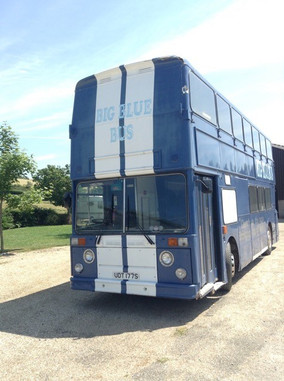The story behind the two-fold vision of Rural Ministries
- Nick Jones

- May 4, 2022
- 3 min read
Nick Jones
Although, 2022 marks 60 years since the official founding of Datchet Evangelical Fellowship, our true origins go back over twenty years before that.
Although 2022 marks 60 years since the official founding of Datchet Evangelical Fellowship, the original vision began many years before this. In 1936, when Pastor Herbert Goddard was in the Lake District, God planted a seed of concern in his heart that rural chapels were closing, leaving large areas across the UK where the gospel was not being heard. This coincided with a seemingly separate seed that something needed to be done to support retiring missionaries when returning to the UK in terms of housing.
It was only at the very end of the 1950’s that God provided the circumstances for Pastor Goddard to nurture these seeds into what was to become Datchet Evangelical Fellowship and fulfilment of his two-fold vision to provide housing and support mission in Britain’s villages. This is how Pastor Goddard put it:
“It was not until the early 1960’s when in the midst of great spiritual trials, I saw how these two visions could be fused for the mutual benefit of both. The first step I realized was to buy an old house set in pleasant surroundings and divide it into flats for retired missionaries”.

These converted flats in Church Lane, Witton on the outskirts of Ipswich opened in 1962 and formed the Fellowship’s base until after Pastor Goddard’s death in 1981.
Pastor Goddard’s second step was to send out a thousand letters with a copy of John’s gospel inviting people to respond to his vision. He received just nine replies, of which one was a begging letter, one was returned unopened, one was abusive, and the rest were plain acknowledgements of receipt. Not a brilliant start!

But not to be deterred, the first village he focused on was Tuddenham near Ipswich, a chapel that had not been open for 20 years. After much renovation it became the first chapel to be re-opened in 1963. The two seeds had started to sprout new shoots and many, many more shoots were soon to follow.
The initial aim laid down in 1960 was to ‘provide homes for retired ministers, missionaries and Christian workers and to establish a Gospel witness in villages where none exists and to help needy causes’. Those aims in 1962 and 1963 were now underway, with many more chapels saved and reinvigorated and housing provided.
Although some churches were planted, it was the focus on enabling mission that was at the centre; encouraging churches and missioners to work across an area, supporting and inspiring others in similar circumstances.
Sixty years later those aims are still in place. The need to provide housing has diminished, but our focus on supporting and encouraging mission in our rural areas is as strong today as it was then. The methods have also changed to keep in step with 21st century requirements, but we believe that Pastor Goddard will recognise and approve of the work done today.
Sometimes history repeats itself; in 1979 Datchet Evangelical Fellowship converted a coach into a mobile church, and in 2014 we supported the conversion of a double decker bus for mission work in Cornwall. Same idea, but a bigger bus!
Over the years we have supported ‘surfing evangelists’, sports workers, an art café church, village chaplains and even a kitchen table! Our conferences and events have grown, even during the pandemic, and reach several hundred people each year.

In 1968 it was said that not a day goes by when prayer is not offered for the rural churches and areas of Britain. Today we still carry on that practice as we circulate our MOSAIC magazine to over 1,400 people, run in person and online conferences, and post a weekly reflection which is read and appreciated by so many.
Like Pastor Goddard we too seek to work with others and are today involved in many of the mainline denominations, as well as several national and regional organisations who
share our vision for rural Britain. We offer input to many of the theological colleges on rural mission, have launched a listening project across the UK, as well as been a prophetic voice to speak into the Church today. We may not hold the number of buildings we once did, but our passion for mission remains as strong as it was back in 1962!







Comments